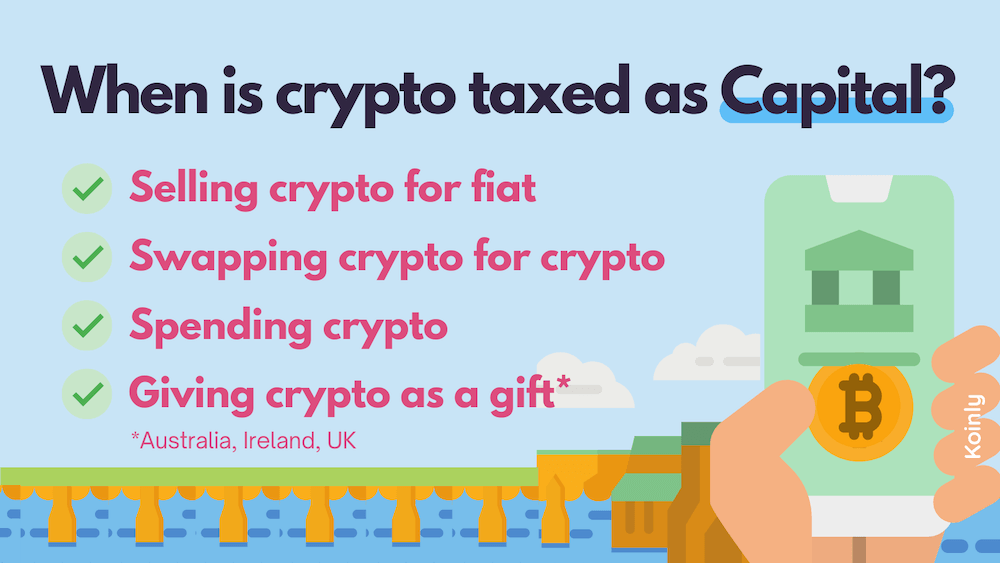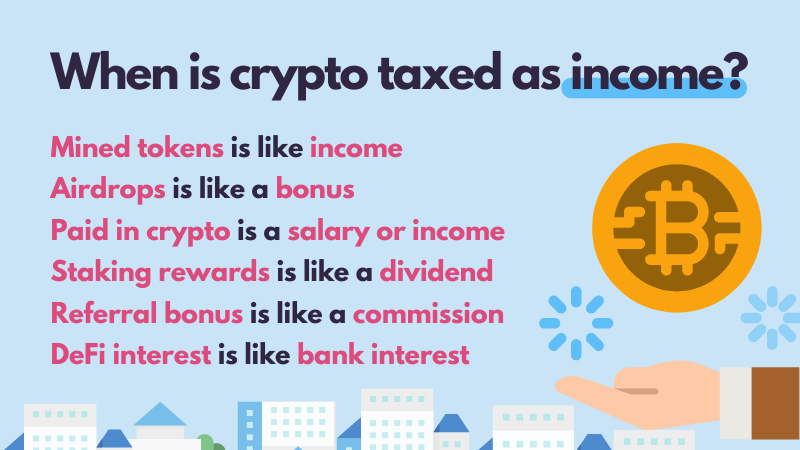Ultimate Bitcoin Tax Guide 2024
Crypto taxes can be confusing and leave investors with a lot of questions like do you pay tax on Bitcoin or is Bitcoin tax free? What's the Bitcoin tax rate? How is Bitcoin taxed and how much tax do you pay on Bitcoin? Or even, how do you avoid Bitcoin tax? Don't worry, our ultimate Bitcoin tax guide is here to help answer all these questions and more. Let's dive in.
The ultimate Bitcoin tax guide is regularly updated
18th December 2023: Updated for 2024!
3rd December 2021: Updated for 2022.
13th June 2020: Updated for 2020.
20th Dec 2019: Updated to reflect new cryptocurrency tax treatment from the IRS, HMRC, and the ATO.
9th Oct 2019: Welcome to Koinly's Bitcoin tax guide!
Do you have to pay tax on Bitcoin?
Yes - Bitcoin is taxed.
It doesn't matter where you live - most tax offices around the world are cracking down on crypto and taxing Bitcoin and other cryptocurrencies.
How your Bitcoin is taxed and how much Bitcoin tax you'll pay depends on where you live, how much you earn, and the type of transactions you're making with your Bitcoin. Let's break it down.
Tax treatment of Bitcoin
Bitcoin isn't recognized as a fiat currency - like USD, GBP, or AUD - by almost all countries worldwide (with the exception of El Salvador). From a tax perspective, Bitcoin is viewed as an asset - much like a property, stock, or share.
Why does this matter?
Because this dictates the tax treatment of Bitcoin.
Each tax office has a slightly different view on cryptocurrencies (so you should always check your country's crypto tax rules) but in general Bitcoin is taxed under Capital Gains Tax or Income Tax.
The type of tax you'll pay depends on the type of transactions you're making with Bitcoin. We'll look at both.
Capital Gains Tax on Bitcoin
Because Bitcoin is seen as an asset - anytime you're seen to be 'disposing' of an asset, you'll pay Capital Gains Tax. Examples of a Bitcoin disposal include:
Selling Bitcoin for fiat currency.
Swapping Bitcoin for another cryptocurrency.
Spending Bitcoin on goods or services.
Gifting Bitcoin (depending on where you live).
 These rules vary slightly depending on where you live, but in general, selling, swapping, and spending Bitcoin is always subject to Capital Gains Tax. Some countries - like the USA - allow you to gift Bitcoin tax free under a certain amount (more on this later).
These rules vary slightly depending on where you live, but in general, selling, swapping, and spending Bitcoin is always subject to Capital Gains Tax. Some countries - like the USA - allow you to gift Bitcoin tax free under a certain amount (more on this later).
When you sell, swap, or spend Bitcoin - you won't pay Capital Gains Tax on the full value of your Bitcoin. Instead, you'll pay tax on Bitcoin gains. This is any profit you've made from selling, swapping, or spending your Bitcoin. Let's look at how to figure out your tax on Bitcoin profit.
Tax on Bitcoin Gains
To know how much Bitcoin tax you'll need to pay - you need to know your capital gain or loss and your Capital Gains Tax Rate. We'll look at both.
Figuring out your capital gain or loss is easy. First, you need to know the cost basis for your Bitcoin. Your cost basis is whatever it cost you to buy your Bitcoin plus any transaction fees. If you acquired your Bitcoin through a gift or other means - your cost basis is the fair market value of the asset in fiat currency on the day you acquired it.


Meanwhile, if you have a negative figure, you have a negative figure this would be a capital loss. You won't pay Capital Gains Tax on Bitcoin capital losses - but you do want to keep track of them (more on this in a minute).
Bitcoin Tax Rate
There isn't a specific Bitcoin tax rate - though that would make things simpler! Instead, your Bitcoin will be taxed under the Capital Gains Tax rate you fall into.
This will vary depending on where you live, what you earn, and how long you've held the asset for. Most countries have a long-term and short-term Capital Gains Tax rate. Short-term capital gains are often taxed at the same rate as your income. Meanwhile, long-term capital gains are taxed at a much lower rate under Capital Gains Tax. Long-term gains apply when you've held Bitcoin for more than a year.
Of course, each country has different Income Tax rates and Capital Gains Tax rates. Skip ahead to see the breakdown of your country's Income and Capital Gains Tax rates, but in short:
US Bitcoin Gains Tax Rate: Short-term Bitcoin gains are taxed at the Federal Income Tax rate - between 10% to 37%. Long-term Bitcoin gains are taxed between 0% to 20%.
UK Bitcoin Gains Tax Rate: Short and long-term Bitcoin gains are taxed at the same rate between 10% to 20% on all gains over £12,300.
Australia Bitcoin Gains Tax Rate: Short-term Bitcoin gains are taxed at your Income Tax rate. Long-term Bitcoin gains receive a 50% discount.
Canada Bitcoin Gains Tax Rate: Short and long-term Bitcoin gains are taxed at your Income Tax rate. However, only half your Bitcoin gain is subject to tax.
The more you earn in regular income - the higher the Capital Gains Tax rate you'll pay on your Bitcoin. Now... about those losses.
Bitcoin Tax Losses
Don't panic, as we said above, you won't pay tax on Bitcoin losses. So if you've sold, swapped, spent, or gifted your crypto and you've made a capital loss, you won't pay Capital Gains Tax.
But it's really important you keep a record of Bitcoin losses. Why?
Because you can offset your Bitcoin losses against your Bitcoin gains to reduce your overall tax bill. In fact, some investors take this to the next level and strategically offset losses against gains to pay less tax. This is known as tax loss harvesting. You can also carry losses forward to offset against future gains.
Each country has slightly different rules for offsetting Bitcoin losses against gains. But in short:
US: There is no limit on how large a capital loss you can offset against capital gains. If your capital losses exceed your net capital gain, offset a maximum of $3,000 against ordinary income. You can carry losses forward indefinitely.
UK: There is no limit on how large a capital loss you can offset against capital gains. If your capital losses exceed your £12,300 allowance, carry losses forward for up to 4 years.
Australia: There is no limit on how large a capital loss you can offset against capital gains. You must offset all the capital losses you can before carrying them forward to future tax years. You can carry losses forward indefinitely.
Canada: You can only offset half your capital losses as you only pay tax on half your capital gains. You can carry capital losses forward indefinitely.
Example
Finn buys 2 BTC in January 2020. The fair market value of 1 BTC on the day he purchases it is $8,000. He pays $100 for each transaction.
Finns cost basis for each BTC is $8,000 + $100 = $8,100.
In December 2020, Finn sells one 1 BTC for $22,000. To figure out his capital gain, he simply needs to subtract his cost basis from his sale price.
$22,000 - $8,100 = $13,900. This is his capital gain and he'll pay tax on this amount.
As he's held his asset for less than a year, he'll pay short-term Capital Gains Tax. Finn lives in America and he earns $86,000 a year in regular income. This puts him in the 24% tax rate bracket. So he'll pay 24% tax on $13,900, or $3,336.
In May 2021, Finn sells his other Bitcoin. The fair market value of Bitcoin on the day he sold it is $55,000. He needs to calculate his capital gain again.
$55,000 - $8,100 = $46,900. This is his capital gain and he'll pay tax on this amount.
As he's held his BTC for more than a year, Finn will pay the long-term Capital Gains Tax rate on his Bitcoin gain. Because he earns more than $40,000 a year and less than $445,850 a year - this puts him in the 15% Capital Gains Tax bracket. So he'll pay 15% tax on $46,900, or $7,035.
Tax on Bitcoin Margin Trades, Futures and CFDs
At the moment Bitcoin margin trading, Bitcoin futures, and other CFDs with Bitcoin are unregulated. So the specific tax treatment on it is pretty hazy and it will depend on where you live as well as the scale at which you're trading.
If you're trading at a similar scale as a day trader - it's highly likely that this would be viewed as business activity and subjected to the relevant Business Income Tax.
However, if you're seen to be trading as an individual investor - your trades are more likely to be taxed the same way traditional margin trades and contracts are in your country. For the most part, this means you'll be paying Capital Gains Tax on Bitcoin profits from margin trading, futures, and other CFDs.
What we mean by this is when you open a position in a margin trade - this isn't a taxable event. The taxable event comes when you close your position. At that point - you'll have a realized capital gain or loss and you'll need to pay tax on any capital gains as a result of a closed position. Bitcoin futures tax rules, and indeed other CFD contracts will also be taxed like this.
Margin Liquidations Bitcoin Tax
When you open a position in a margin trade, you'll most likely have a liquidation clause in there. This means your collateral will be sold if the value of your borrowed funds falls below the value of your collateral. In the event of liquidation, from a tax perspective, this is a disposal and is subject to Capital Gains Tax.
Wrapped Bitcoin Tax
Wrapped Bitcoin (WBTC) has increased in popularity as the DeFi market booms. When you 'wrap' Bitcoin - you exchange it for a WBTC token of the same value. This allows you to effectively use WBTC on the Ethereum blockchain and opens up a world of DeFi investment opportunities.
Because you're exchanging one token for another - wrapping Bitcoin is a taxable event in all countries that view swapping crypto as a taxable event. This means you'll pay Capital Gains Tax on any profit.
From a tax perspective - WBTC is treated exactly the same as Bitcoin. So when you spend, swap, sell, or gift your WBTC - this will be subject to Capital Gains Tax. When you earn WBTC - this will be subject to income tax. You can learn more in our Wrapped Tokens Guide.
Bitcoin Income Tax
There are many more transactions you can make with Bitcoin and here's where it gets a little more confusing. Bitcoin can be taxed as income in some instances. Bitcoin transactions that could be taxed as income include:
Getting paid in Bitcoin - like a salary.
Mining Bitcoin - like income.
Earning Bitcoin through loaning- like earning interest.
Receiving new coins from a Bitcoin fork - like a bonus.
 These are just a few examples and each tax office has a slightly different view on what qualifies as Bitcoin income and what doesn't - so check your country's crypto tax rules.
These are just a few examples and each tax office has a slightly different view on what qualifies as Bitcoin income and what doesn't - so check your country's crypto tax rules.
When your Bitcoin is taxed as income, it will be taxed at the same rate as your current Income Tax rate. It's easy to figure out how much Bitcoin tax you'll pay. Just take the fair market value of Bitcoin on the day you received it and convert this into your chosen fiat currency - like USD or GBP. You'll pay tax on that amount at your normal Income Tax rate.
It's important to note that Bitcoin you've paid Income Tax on will still be subject to Capital Gains Tax when you later sell, swap, spend, or gift it. So you'll be paying two kinds of tax on Bitcoin in these instances.
Of course, every country has different Income Tax Rates, but in summary:
US: Between 10% to 37% (plus any applicable State Income Tax).
UK: Between 0% to 45%.
Australia: Between 0% to 45%.
Canada: Between 15% to 33% (plus Provincial Income Tax).
Mining Bitcoin Tax
Though we've just said you'll pay Income Tax on mining Bitcoin - this isn't always the case. In fact, you'll only pay Income Tax on mining Bitcoin if you're mining as a hobby. Whereas if you're seen to be mining as a business - you'll pay a different tax entirely.
Each tax office has a slightly different take on what a crypto mining business is or isn't. In general, this all depends on:
How much you make mining Bitcoin.
The way in which you carry out Bitcoin mining activities.
Your history mining Bitcoin and previous profits and losses.
The amount of time and effort involved in mining Bitcoin.
So if you've got one mining rig set up and you're mining a negligible amount of BTC a day - this is very likely to qualify as hobby mining and be taxed as income. Whereas if you have multiple Bitcoin mining rigs set up and/or you're part of a Bitcoin mining pool - this is far more likely to be seen as a crypto business. The tax treatment of crypto business activities depends on where you live - it may be subject to Self-Employment Tax, Business Income Tax, Corporation Tax, and more. But you'll also often be able to make tax deductions for things like mining equipment, running costs, and more.
Example
Madison mines Bitcoin. Over the course of the year, she earns 0.5 BTC through her mining activities. She is a hobby miner.
Madison lives in America and earns $40,000 a year, putting her in the 22% tax bracket. She has kept track of the fair market value of Bitcoin on the day she received it throughout the year and in total her 0.5 BTC is worth $22,000. This doesn't put her into the next tax bracket, so she'll pay 22% in tax on $22,000, or $4,840.
If Madison later sells, swaps or spends her 0.5 BTC, she'd pay Capital Gains Tax.
Bitcoin Fork Tax
The first thing you need to know about Bitcoin fork tax is that whether you'll pay tax depends on whether it's a soft or a hard fork. Bitcoin soft forks are not taxed, but Bitcoin hard forks may be taxed. Many tax offices view new coins from a fork as a type of income and subject them to Income Tax, but in short:
US: Hard forks are taxed as income.
UK: No tax on hard forks.
Australia: No tax on hard forks as an investor, tax if your crypto activities are viewed as business activities.
Canada: Possibly taxable depending on whether you're viewed as a business or an individual.
Like above, to identify how much tax you'll pay - just take the fair market value of the coin(s) on the day you received them, convert it into fiat currency, and apply your Income Tax rate.
When is Bitcoin tax free?
It's not all doom and gloom - there are some instances when Bitcoin is tax free. This includes:
Buying Bitcoin with fiat currency.
HODLing Bitcoin.
Transferring Bitcoin between your own wallets.
Gifting Bitcoin or donating Bitcoin - depending on where you live.

Bitcoin Gift Tax and Donations of Bitcoin
Bitcoin gift tax varies depending on where you live. Some countries view gifting Bitcoin as a disposal and subject it to Capital Gains Tax, while other countries allow Bitcoin gifts under a certain amount to be tax free.
 You can find out more about Bitcoin gift tax in our guide, but in short:
You can find out more about Bitcoin gift tax in our guide, but in short:
US: Gift up to $15,000 per family member or friend tax free.
UK: Gifting Bitcoin is subject to Capital Gains Tax, however, if you're gifting Bitcoin to your spouse or civil partner - this is tax free.
Australia: Gifting Bitcoin is subject to Capital Gains Tax.
Canada: Gifting Bitcoin is subject to Capital Gains Tax.
When it comes to donating Bitcoin - provided you're donating to a registered charity that can accept Bitcoin donations - most tax offices allow this as a tax free event. Some tax offices even let you deduct your Bitcoin donation to reduce your overall tax bill.
How to avoid Bitcoin tax
There is no legal way to avoid tax on Bitcoin altogether. Tax offices are cracking down on crypto to ensure Bitcoin investors are paying their fair share. However, there are many ways to pay less tax on Bitcoin. We've got a great guide on how to legally avoid crypto tax, but here are some of the top tips on avoiding Bitcoin tax:
HODL Bitcoin to enjoy long-term Capital Gains Tax discounts.
Know your tax-free thresholds and tax deductions.
Offset Bitcoin losses against Bitcoin gains.
Invest in IRA, pension, or annuities funds.
Gift Bitcoin to utilize lower tax rates or allowances in your household.
Donate Bitcoin for a tax deduction.
Invest in opportunity-zone funds.
Track and harvest your unrealized Bitcoin losses.
How does the tax office know about my Bitcoin?
If you haven't heard, the IRS, HMRC, the ATO, the CRA, and more are cracking down on crypto. They're working with large crypto exchanges to share customer information and send out letters to investors who need to pay Bitcoin tax.
The best way to stay tax compliant is to report your crypto taxes accurately. Using a crypto tax calculator like Koinly makes this simple.
Tax Implications of Bitcoin Worldwide
We've hinted at this already - but the tax implications of Bitcoin and other cryptocurrencies will vary depending on where you live. All of the above is true in general for most countries, but each tax office has a slightly different rule when it comes to Bitcoin tax. Let's take a brief look at how Bitcoin is taxed around the world to see how it varies.
IRS Bitcoin Tax
The IRS has very clear Bitcoin tax rules which you can learn about in-depth in our US Crypto Tax Guide. But to summarize:
Buying Bitcoin with USD: Tax free.
Selling Bitcoin for USD: Capital Gains Tax.
Trading Bitcoin for another cryptocurrency: Capital Gains Tax.
Spending Bitcoin on goods or services: Capital Gains Tax.
Gifting Bitcoin: $15,000 per person tax free.
Donating Bitcoin: Tax deductible.
HODLing Bitcoin: Tax free.
Getting paid in Bitcoin: Income Tax.
Earning Bitcoin from lending: Income Tax.
Earning interest on Bitcoin: Income Tax.
Mining Bitcoin: Income tax for hobby miners.
Bitcoin hard forks: Income Tax.
Bitcoin margin trades, futures, and other CFDs: Capital Gains Tax.
UK Bitcoin Tax
HMRC has very clear Bitcoin tax rules which you can learn about in-depth in our UK Crypto Tax Guide. But to summarize:
Buying Bitcoin with GBP: Tax free.
Selling Bitcoin for GBP: Capital Gains Tax.
Trading Bitcoin for another cryptocurrency: Capital Gains Tax.
Spending Bitcoin on goods or services: Capital Gains Tax.
Gifting Bitcoin: Capital Gains Tax. Tax free to spouse or civil partner.
Donating Bitcoin: Tax free.
HODLing Bitcoin: Tax free.
Getting paid in Bitcoin: Income Tax and National Insurance contributions.
Earning Bitcoin from lending: Income Tax.
Earning interest on Bitcoin: Income Tax.
Mining Bitcoin: Income tax for hobby miners.
Bitcoin hard forks: Tax free.
Bitcoin margin trades, futures, and other CFDs: Capital Gains Tax.
Australia Bitcoin Tax
The ATO has very clear Bitcoin tax rules which you can learn about in-depth in our Australia Crypto Tax Guide. But to summarize:
Buying Bitcoin with AUD: Tax free.
Selling Bitcoin for AUD: Capital Gains Tax.
Trading Bitcoin for another cryptocurrency: Capital Gains Tax.
Spending Bitcoin on goods or services: Capital Gains Tax - unless a personal use asset.
Gifting Bitcoin: Capital Gains Tax.
Donating Bitcoin: Tax free.
HODLing Bitcoin: Tax free.
Getting paid in Bitcoin: Income Tax.
Earning Bitcoin from lending: Income Tax.
Earning interest on Bitcoin: Income Tax.
Mining Bitcoin: Income tax for hobby miners.
Bitcoin hard forks: Tax free.
Bitcoin margin trades, futures, and other CFDs: Capital Gains Tax - providing you're an investor not a day trader.
Canada Bitcoin Tax
The CRA has very clear Bitcoin tax rules which you can learn about in-depth in our Canada Crypto Tax Guide. But to summarize:
Buying Bitcoin with CAD: Tax free.
Selling Bitcoin for CAD: Capital Gains Tax.
Trading Bitcoin for another cryptocurrency: Capital Gains Tax.
Spending Bitcoin on goods or services: Capital Gains Tax.
Gifting Bitcoin: Capital Gains Tax.
Donating Bitcoin: Tax free.
HODLing Bitcoin: Tax free.
Getting paid in Bitcoin: Income Tax.
Earning Bitcoin from lending: Income Tax.
Earning interest on Bitcoin: Income Tax.
Mining Bitcoin: Income tax for hobby miners.
Bitcoin hard forks: Tax free.
Bitcoin margin trades, futures, and other CFDs: Capital Gains Tax - providing you're an investor, not a day trader.
Free Bitcoin Tax Calculator
Koinly is a free Bitcoin tax calculator. Koinly works with Bitcoin and also supports the majority of other cryptocurrencies - plus we're adding new tokens and coins all the time. If you want to calculate Bitcoin taxes, it's easy to do with Koinly. Just follow these simple steps or watch the video below:
Sign up for a free Koinly account.
Sync all the crypto wallets, exchanges, or blockchains you use with Koinly via API or CSV file.
Let Koinly calculate your Bitcoin taxes. It'll calculate your Bitcoin gains and losses and any Bitcoin income, as well as your expenses in mere minutes.
Head to the tax reports page in Koinly to see a summary of your Bitcoin taxes.
Scroll down and find the tax report you need. You can download specific tax reports for your country - like the IRS Form 8949 and Schedule D for reporting Bitcoin gains for American investors or the HMRC Capital Gains Summary Form for reporting Bitcoin gains for UK investors. Koinly can even generate tax reports for tax apps like TurboTax and TaxAct.
Pay for the crypto tax plan you need, when you need it.
Koinly makes crypto tax easy. Get started for free today.




